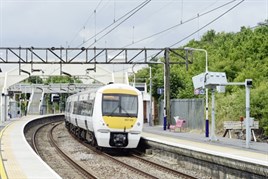 Read the peer reviews for this feature.
Read the peer reviews for this feature.
The new team at the Department for Transport, led by Rail Executive Director General Claire Moriarty and Franchising Director Peter Wilkinson, has finally answered the long-asked question of what rail franchising is for.
It has previously been seen variously as: a form of passenger taxation presented in a requirement to maximise premium income; a barrier to competition in the market by objecting to open access operators; and an obstacle in the way of improving journey experience by the micro-management of everything from the timetable to rolling stock provision.
At last we have the determination that franchise contracts must work for the benefit of passengers, and that the assessment of bids and weighting of scores will be focused on that objective, rather than the narrow measure of financial benefit that has been the sole arbiter in the past.
There is also the mature understanding that a level of profit must be earned by private companies to meet their cost of capital. This cannot be avoided if there is to be a transfer of risk that genuinely protects the taxpayer if delivery of the franchise business plan fails.
The meltdown that followed the weaknesses evident in the bidding process for the West Coast Main Line contract in 2012 cannot be ignored. This was entirely a problem of the DfT’s own making, as it was the way that officials chose to implement departmental cost savings that led to the abolition of a rail-specific organisation, with responsibilities for industry functions spread around the leadership team. There was also an aversion to hiring consultancy expertise to fill gaps in the skills and experience of the available civil servants.
As a result, two inquiries/reviews were conducted by Sam Laidlaw and Richard Brown. The former concluded that the way the DfT was organised was not fit for purpose in the management of rail functions and the franchising process, and that a structure was needed to provide the expertise necessary to achieve Government objectives.
Richard Brown’s review looked to the future, and what needed to be done to allow the franchise system to work for the benefit of industry stakeholders - including taxpayers, train operators, infrastructure providers and contractors, and (most importantly of all) passengers.
At the heart of recommendations was the need to restore a dedicated Rail Group within the DfT, and appoint an executive responsible for defining the franchising process and managing its implementation.
Peter Wilkinson was appointed to this role. One of the early findings was that the programme of contract renewals could not be managed with the available resources, and that to be realistic it was necessary to restrict refranchising activity to three competitions annually. As a result, a schedule was established that included Direct Awards to extend existing franchises - one such is the West Coast route, where Virgin will now continue to operate services until 2017.
Rail Delivery Authority
The Government intends to go further, by establishing a new Rail Delivery Authority (RDA). This is a response to the realisation that a situation had been allowed to develop whereby civil servants lacked the necessary railway and financial knowledge to provide industry leadership and conduct contract procurement of a specialist nature.
It also recognised that attempts to improve the skills gap had been unsuccessful, as it had not proved possible to recruit people with the necessary skills and experience within the civil service employment framework.
The creation of a Rail Delivery Authority cannot happen quickly because legislation is required, and it is not possible to introduce this before May 2015 when the current coalition Government ends. To make progress in the short term, the DfT has reorganised and separated rail franchising activity from other work it performs.
A new organisation called the Office of Rail Passenger Services will be created to manage the franchising process. It will have its own Managing Director, and the job was advertised in May 2014 at a salary of £250,000. In early September, Peter Wilkinson was appointed.
The post holder will advise ministers on longer-term strategy for franchise policy, and support the Secretary of State in understanding the political agenda alongside commercial considerations, in order to secure the best possible outcomes for rail passenger services.
The skills required are listed in the job description, which identifies a need to navigate complex landscapes and build credibility across the rail industry, as well as with ministers and key players in Whitehall.
Peter Wilkinson comes with experience of establishing, leading and motivating high-performing teams. A collaborative style and sensitivity to the political context and complex stakeholder environment will be essential. His ability to manage commercial negotiations within a public sector and political environment will be important, alongside a collegiate approach to working in partnership with colleagues, contractors and stakeholders alike. His prior experience of the rail industry will be crucially important.











